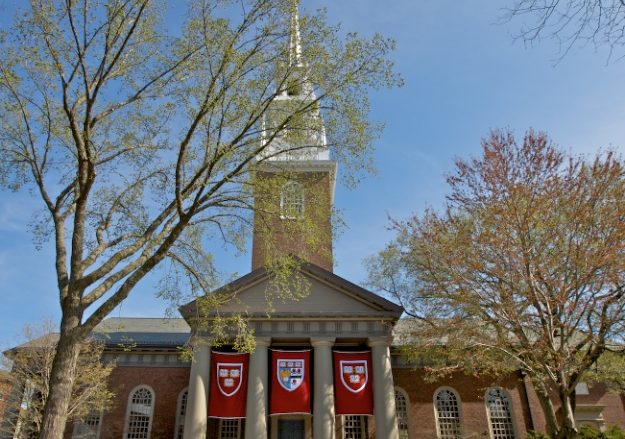Fraternities and Sororities Sue Harvard Over Anti-Single-Sex Policy
By Matt McDonald | December 4, 2018, 18:27 EST
 Memorial Church in Harvard Yard. Photo By Crimson, courtesy of Wikipedia
Memorial Church in Harvard Yard. Photo By Crimson, courtesy of Wikipedia Harvard College is discriminating against students on the basis of sex by trying to force single-sex student organizations to go co-ed, a federal lawsuit claims.
Two fraternities, two sororities, and three male undergraduates are asking a federal judge to issue an injunction forcing Harvard not to pressure students against joining an all-male or all-female student group.
A new policy at Harvard threatens current freshmen, sophomores, and students who follow them with losing the ability to serve as captain of one of the school’s sports teams, serve as a leader of one of the school’s officially recognized student groups, or get a recommendation for a fellowship. Students who seek these distinctions would be forced to sign a statement saying they don’t belong to a single-sex organization.
College officials have used poorly researched, shifting claims to try to get at all-male final clubs, which have longstanding ties to the school but are accused of fostering elitism and misogyny, the plaintiffs argue. In so doing, the plaintiffs maintain, the college has destroyed sororities that help female undergraduates.
“From the outset, Harvard intended to eliminate all-male organizations because of their all-male character,” the complaint states. “Perversely, Harvard ended up harming women at least as much as men in its attempt to destroy all-male organizations.”
That has led to an incoherent and unwise campus-wide policy, say the plaintiffs.
“It is now the official policy of Harvard University to punish any woman who joins an all-female group for no other reason than that it is all-female and to punish any man who joins an all-male group for no other reason than that it is all-male,” the complaint states. “Unrecognized single-sex social organizations are the only kind of organizations that Harvard punishes students for joining. A Harvard undergraduate could join the American Nazi Party, or could create an off-campus undergraduate chapter of the Ku Klux Klan, without running afoul of the Sanctions Policy or any other Harvard student-conduct policy. Those groups may be heinous, but they are co-ed, so under Harvard’s rules, its students may belong without any threat of sanction. But Harvard punishes students for joining sororities, fraternities, and final clubs because they are single-sex even though they are private, off-campus, and unaffiliated with Harvard.”
The plaintiffs are two national fraternities: Sigma Chi and Sigma Alpha Epsilon; two sororities: Kappa Alpha Theta and Kappa Kappa Gamma; and three unidentified male undergraduates who say they belong to all-male groups that have suffered from Harvard’s policy.
The dean of the college, Rakesh Khurana, has been the point man on Harvard’s policy, which was also supported by Drew Gilpin Faust, who served as president of the university from 2007 until this past July 1. The policy split faculty members, but they ultimately voted 130-90 against a motion that sought to overturn it, in November 2017. The directors of Harvard Corporation, which is one of the school’s governing boards, voted in December 2018 to adopt the policy, which makes it harder for future administrators to overturn it.
Rachael Dane, a spokesman for Harvard College, said college officials are trying to foster inclusivity and root out discrimination.
“Harvard College seeks to build a community in which every student can thrive, and it does so on a foundation of shared values, including belonging, inclusion, and non-discrimination,” Dane said in an email message late Tuesday afternoon. “The policy on Unrecognized Single-Gender Social Organizations (USGSO) is designed to dedicate resources to those organizations that are advancing principles of inclusivity, while offering them supportive pathways as they transform into organizations that align with the educational philosophy, mission, and values of the College.”
Dane pointed out that Harvard does not have a long history with fraternities and sororities. She said excluding members on the basis of sex violates the college’s values.
“In accordance with these values, and for more than a century, Harvard has not had a Greek system on campus. As President Faust and the Harvard Corporation said in December of 2017, it is the expressed expectation of this community that Harvard should not become a Greek school. Harvard should not have to change its commitment to non-discrimination and educational philosophy for outside organizations that are not aligned with our long-standing mission,” Dane said.
Final clubs have a long history with Harvard. The oldest, the Porcellian Club, was founded in 1791, and gave the gate to Harvard Yard that is directly across the street from the building the club owns. Several others were founded during the 19th century.
They are not so-called Greek organizations (meaning fraternities) because they do not affiliate with national organizations.
In 1984 the university dissociated itself from final clubs because the clubs refused to admit women. (Harvard College went coed in 1977.)
Critics call final clubs elitist and demeaning to women, who aren’t allowed to join but are invited to parties at several of them. Supporters say final clubs offer camaraderie and that joining one is a right that stems from freedom of association.
Several final clubs have been resisting Harvard’s new single-sex policy, but no final clubs are currently parties in the lawsuit.
While all-male final clubs appear to be the original target of Harvard’s new policy, and while fraternities and sororities are feeling squeezed by it, other campus organizations are feeling the brunt of it, too.
Harvard’s all-male and all-female a cappella groups, for instance, are feeling the heat to let in members of the opposite sex, according to the plaintiffs’ complaint. The all-male Knights of Columbus, which is the largest Roman Catholic lay organization in the world, has a council at Harvard, which the plaintiffs contend now may have to let in females or else subject its members to Harvard’s penalties. Ditto for the Daughters of Isabella, a lay Catholic women’s organization that has a chapter at Harvard.
“If all of this seems hard to justify, it is,” the plaintiffs’ complaint says.
The complaint argues that Harvard’s policy stems from a disjointed view of men and women.
“The common thread that ties together all of Harvard’s ever-shifting justifications for the Sanctions Policy is sexism,” the plaintiffs argue, dismissing Harvard’s claims that all-male final clubs foster a culture of sexual assault against females, saying there’s no evidence for it.
“Harvard’s view that all-male clubs — because they are all-male — are misogynistic, racist, homophobic, and classist, is also sexist,” the complaint argues. “So is Harvard’s view that men’s organizations — because they are men’s organizations — dispense privilege and advantage that otherwise would not be dispensed were they co-ed. There is nothing intrinsic to being a man, or joining a men’s social club, that causes any of these harms. Yet Harvard has consistently asserted that students should be punished for joining all-male organizations — any all-male organizations — because men’s organizations have these negative characteristics.
“Nor is there anything intrinsic to being a woman, or joining a women’s social club, that causes any harm. Harvard’s claims that single-sex organizations subordinate women, or harm Harvard’s commitment to diversity or inclusion, are also sexist. Single-sex organizations, all-male and all-female alike, can and do contribute greatly to diversity and inclusion by creating spaces where students can come together to lift up and empower each other. That is why so many of Harvard’s affinity groups are single-sex.”
The complaint was filed Monday, December 3 in U.S. District Court in Boston.











